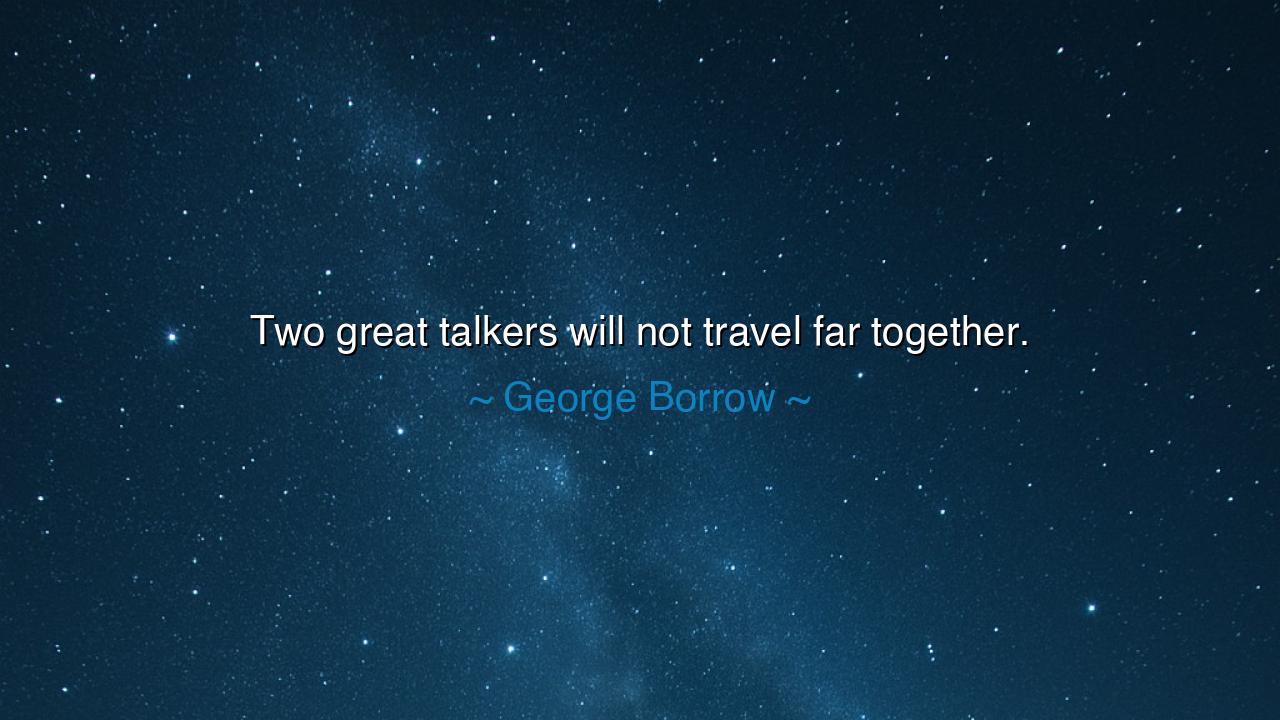
Two great talkers will not travel far together.






Hear now, O child of wisdom, the words of George Borrow: “Two great talkers will not travel far together.” At first, these words may sound but a jest at idle chatter, yet beneath them lies a law as old as the roads of Rome and as deep as the rivers of the East: that progress is not forged by speech alone, but by the marriage of word and deed. For when both are content to speak, none is left to act, and thus the journey is delayed, the horizon never reached.
In the days of old, the sages taught that the tongue is a sharp tool, but like all tools, it must be wielded with discipline. To talk is to dream aloud, to set visions before the mind’s eye. But if two travelers do nothing but speak, their feet grow heavy, their hands idle, and the path stretches before them, endless and unconquered. Borrow’s saying is a warning to those who mistake sound for substance: that while speech can inspire, only action can carry one to destiny.
Consider the tale of the Athenian assembly, where in the time of Demosthenes the people would gather to debate the threat of Philip of Macedon. Voices rose like thunder, arguments clashed like spears, yet the armies of Philip marched ever closer. They spoke long, yet acted little. Thus Athens fell not for lack of eloquence, but for lack of decisive action. Truly, two great talkers—or an entire city of them—cannot travel far, for their strength is consumed in words, while the world moves onward.
But contrast this with the march of Julius Caesar, who though skilled in oratory, tempered his speech with relentless motion. He could rouse his men with words, yet he did not linger in endless discourse. His legions built bridges in days, crossed rivers in storms, and carried Rome’s banners to the edge of the known world. Caesar knew that words alone are smoke, but when bound to deed, they become fire that shapes history. Thus his journey was long and his legacy enduring, because he was not merely a talker, but also a doer.
There is also wisdom here for the bonds of friendship and partnership. If two companions on a road are both consumed with speaking, neither listens, and harmony dissolves. One must sometimes yield to silence, to hear, to understand, and to act. Without such balance, no fellowship can endure. Borrow’s proverb is not only about journeys of the body, but journeys of the spirit, the home, the enterprise, and the nation. Where there is only talk, unity fades and progress halts.
O listener, take this lesson deep into your heart: let your words be few but weighty, and let your deeds rise to meet them. When you travel with another, do not strive to outtalk, but to outserve, to outendure, to outact. Let one guide with speech and the other with motion, or better still, let each know the time to speak and the time to be silent. This is the way companions travel far together, and this is the road to lasting success.
The clear teaching, then, is this: guard against the vanity of endless speech. Dream, but also build. Speak, but also walk. Listen, but also labor. For a thousand words cannot cover the distance of a single step, and two tongues moving faster than two feet will never conquer the horizon.
Therefore, O seeker, be not merely a talker, but a traveler. Choose companions who act as well as speak, and strive yourself to balance eloquence with endurance. For the road is long, the night is deep, and only those who turn words into motion shall arrive at dawn’s shining gates.






AAdministratorAdministrator
Welcome, honored guests. Please leave a comment, we will respond soon